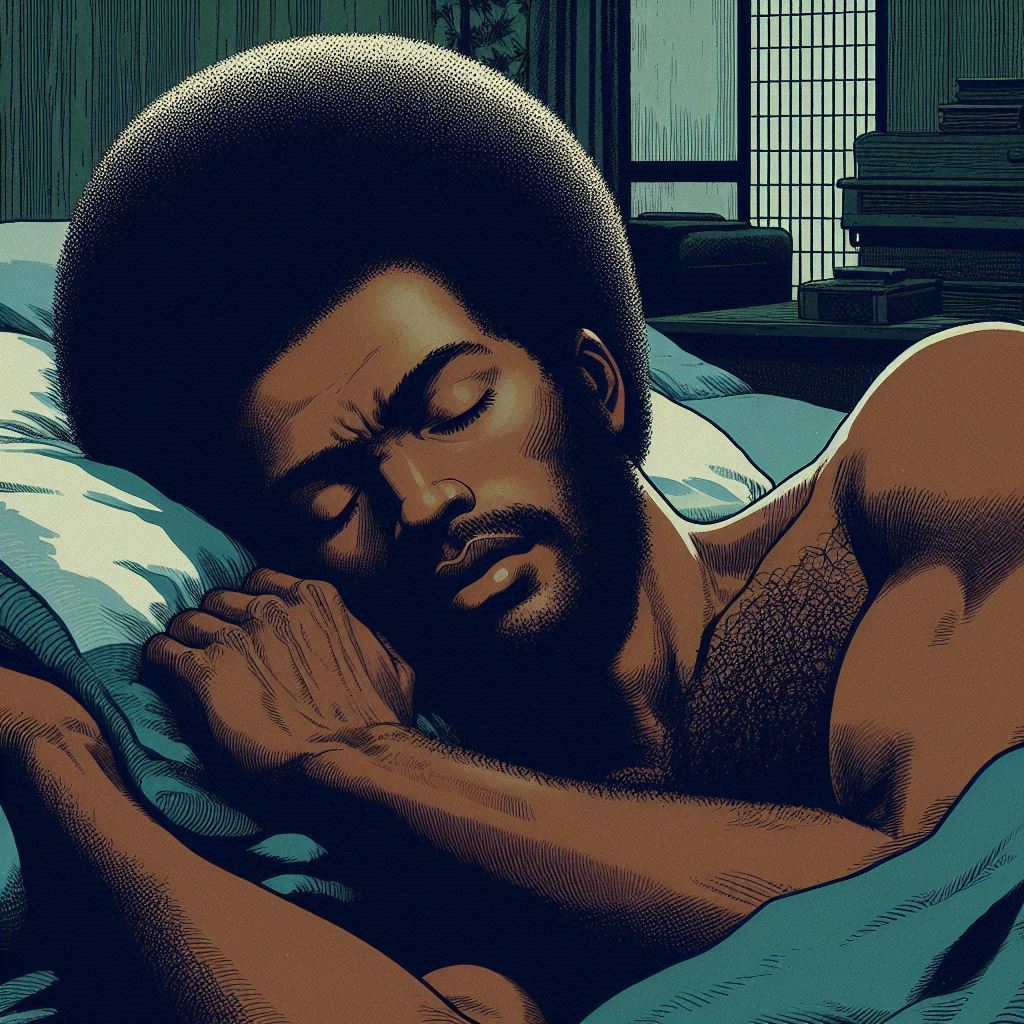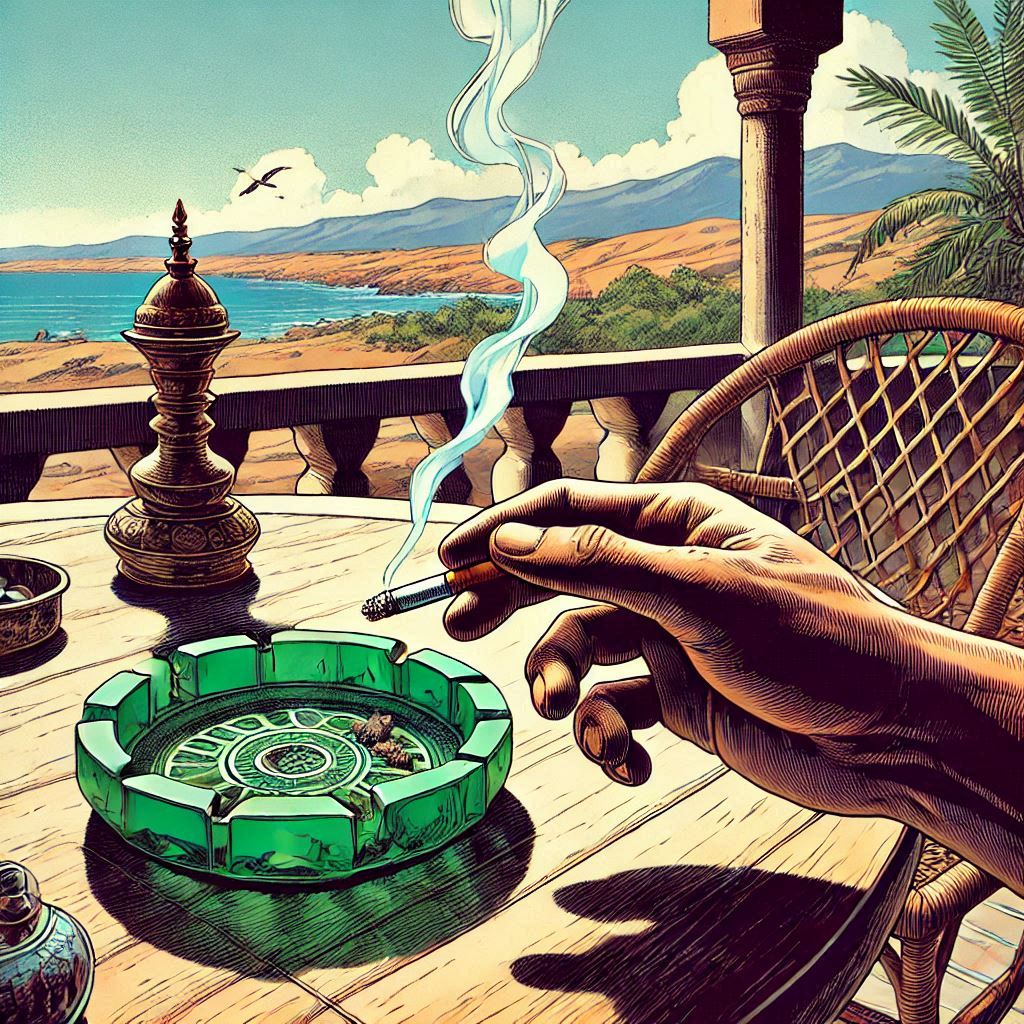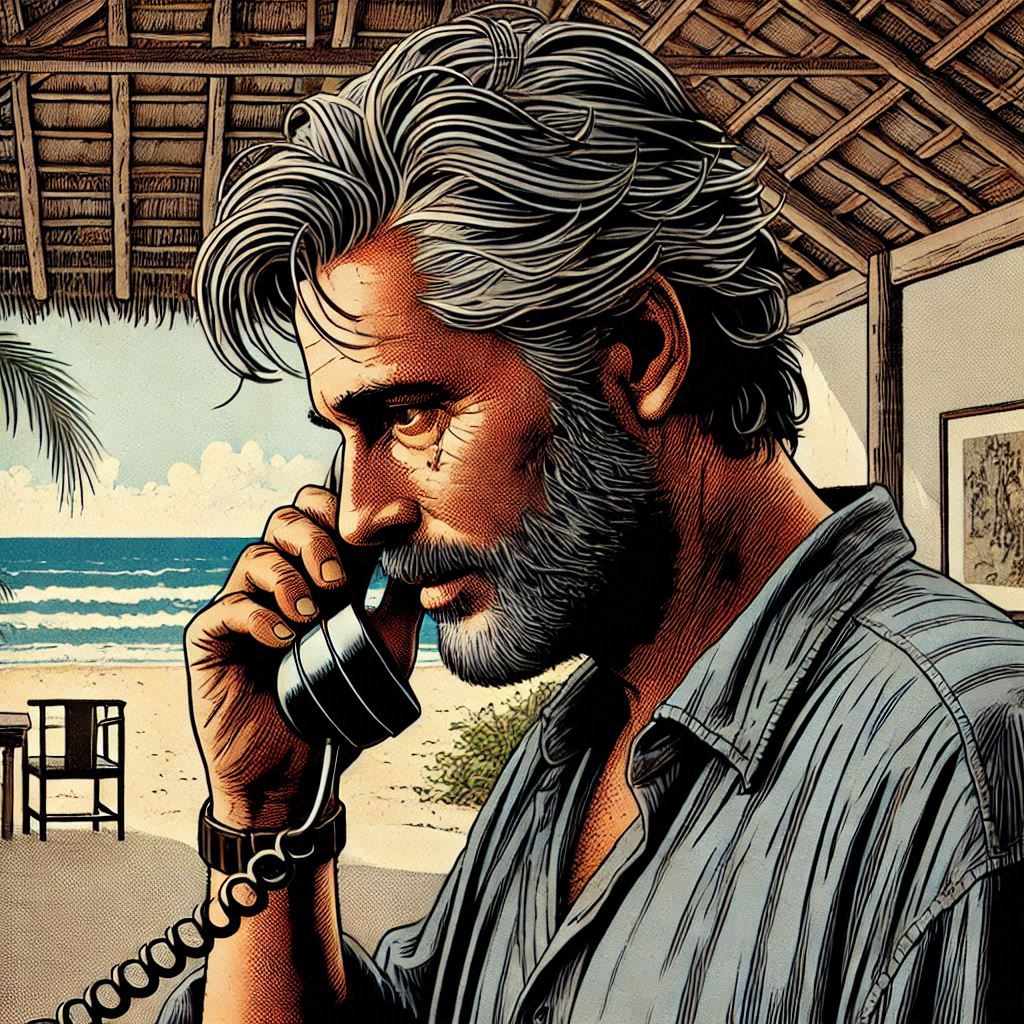Gorilla Republic: Deutschland: Part 9
11th December 2024

He was not sure if the knock was real or imagined. Rolling on the bed, his hand instinctively reached out for Abril, seeking the tender warmth he had grown to crave. His fingers found only emptiness, prompting him to open his eyes. Reality hit: he was alone. A second soft series of knocks emanated from the other side of the door, accompanied by a hushed, gentle whisper.
The dizzying darkness swirled around him, adding to his disorientation as he assembled his thoughts. Finally, he rolled off the bed, lazily grabbing the towel draped over his waist, and lumbered to the door. Cautiously cracking it open, he peeked through the narrow gap to find Banou standing there. Rosy-cheeked and cheerful, she looked radiant in a pink sheer djellaba, its silhouette unapologetically revealing her inviting figure. He forced his gaze upwards and met her eyes.
“Ola! Did I wake you?” she asked, her tone too sweet to be innocent.
His nettled glare conveyed his lack of amusement, and she winced in mock apology.
“Sorry,” she added quickly. “It is just—you have been asleep for ages. Makhlouf’s waiting to talk. Plans for the job.”
His hoarse whisper was unintelligible, so she leaned closer, her scent lightly floral and enticing.
“Let me shower,” he muttered finally. “I will join you in a few minutes.”
Banou smiled—a mischievous twinkle in her eyes—and sashayed away, leaving him staring at her swaying voluptuous derrière as she vanished down the corridor. Shutting the door firmly, he shook his head and stepped into the shower. Minutes later, refreshed and dressed in a light shirt, pale brown bell-bottoms, and his trusty brown sandals, he made his way out to the courtyard.
Makhlouf greeted him warmly, and Mapacha responded with a polite nod. The courtyard overlooked a lush garden, and the afternoon breeze carried the scent of the ocean, its coolness soothing. Mapacha poured himself a cup of tea, grabbed two msemmen pancakes, and devoured them ravenously.
Makhlouf lit a cigarette, inhaling deeply before he broke the silence.
“Do you know what a hamsa is?”
Both Mapacha and Banou stared at each other before they shook their heads.
“It’s a symbol from our culture,” Makhlouf explained, his tone casual. “An amulet, shaped like a palm. It protects against the evil eye—a curse that brings misfortune.”
Banou’s eyebrows arched in curiosity.
Makhlouf leaned forward, exhaling smoke.
“One particular hamsa has been in my family for generations. It was stolen during the war. I want it back.”
“You want us to steal it?” Mapacha asked bluntly.
“Yes,” Makhlouf replied, unflinching, “though stealing seems a bit extreme. Recover is how I would put it.”
Banou’s lips curved in scepticism.
“Why not just have another one made?”
“This isn’t about any hamsa. It’s about my family’s hamsa. Its history, its significance—those cannot be replaced.”
Banou nodded, though the plan still seemed far-fetched.
“Do you know who took it?”
Makhlouf’s smile turned grim.
“I have a rough idea, yes.”
“So why not send your own crew?” Mapacha pressed. “You have got enough connections.”

Makhlouf stubbed out his cigarette, lighting another with deliberate care. “Because it is too important. My people might get greedy. Worse, they could use it against me. I need outsiders, people who will leave no trace of my involvement.”
“And the thief? Where is he located?” Mapacha asked.
“Munich. West Germany.”
Banou frowned. “You do realise we will stand out, right?” She gestured to her glorious afro that softly waved in the evening breeze.
Makhlouf grinned.
“Not as much as you think. West Germany is open to business with everyone, unlike across the border. So, act the part—a couple or students—and no one will bat an eye.”
Mapacha was not convinced.
“How do we even get into Munich?”
“My driver will take you. From Tarifa, across Europe. Once there, you will get all the information you need. Find the thief, get the hamsa, and my contact will bring you back.”
Mapacha scoffed.
“Just like that?”
Makhlouf’s expression remained steady.
“Just like that.”
“Banou, este plano é perigoso. Não vai funcionar ("Banou, this guy is mad. This plan is dangerous. It will not work.”),” Mapacha muttered in Portuguese, his voice low, but urgent.
Banou’s lips tightened, understanding his concern. But Makhlouf’s next move was masterful—his voice was soft, persuasive.
“There is a million dollars at stake. Plus all expenses covered.”
She swallowed hard as the hook sunk deeper, entangling itself with her greed and temptation, soaking into the core of her deepest desires. Her mental cash register quickly rang up the possibilities. The diamond job had been lucrative, even after splitting it four ways, but this gig—this was almost double her cut. And now, it was just her and Mapacha. The stakes felt higher, the prize even more tantalising.
For the first time, Mapacha felt a similar tug of temptation, and it caught him off guard. Was Makhlouf really that persuasive? Had he, with his calculated pitch, managed to disarm Mapacha’s natural scepticism? He was not exactly money-minded. His mind ticked with the same mental arithmetic as Banou’s: this payday promised incredible wealth, but uncertain lives. Yet, the idea of Europe gnawed at him. He had never been there and did not know its rules, its ways. And Banou—her emotions, mingled with Makhlouf’s manipulative charm and her own greed—were not helping.
In his mind, Mapacha wrested control of the situation. He decided he could not afford to let her lead this one.
“If you are genuine about this job,” Mapacha began, his voice measured and firm, “we will do it. But understand this—there are no guarantees of success. If we fail, you will owe us at least 10 percent for our troubles. I also will not guarantee the quality of the goods. We will do what we can.”
Then his voice dropped, cold and gravelly, his eyes narrowing to feral slits.
“But if this is a setup—if you are lying—I will come back for you. And I will not hesitate to personally sever your soul from your body.”
Banou inhaled sharply, startled. She had seen this side of Mapacha before, twice at most. The icy resolve in his tone, the unrelenting haze of cold-blooded intent that shrouded him—it was terrifying. And she knew he was not bluffing.
Makhlouf, however, remained unfazed, his composure unbroken. He had seen Mapacha’s brutality first-hand: Diae and Kadour reduced to humiliated wrecks in Casablanca, the harrowing reports of the Ivorians and Kobus beaten into submission. His nickname for Mapacha, 'psycho', was not just for show. In truth, he was more astonished that Mapacha’s violent streak had not claimed lives yet.
“Excellent,” Makhlouf said smoothly, his grin sharpening into a fiendish wolfish crescent. “Then let me make the arrangements. You will need to prepare. You leave tonight.”
“So soon?” Banou’s voice betrayed her unease.
“The sooner, the better,” Makhlouf replied without hesitation.

Mapacha gave a single nod. Another night in Makhlouf’s domain—or anywhere near him or the other Moroccans—was out of the question. Makhlouf rose, offering a shallow bow of thanks, before picking up the phone set out against the wall. The sharp, rapid rhythm of Darija filled the room as he barked orders into the receiver.
When he returned, his tone was practical, though his predatory grin lingered. “Spend the rest of the day resting. Swim if you would like—there’s the pool or the ocean. You will leave after midnight, and the crossing will be before dawn.”
“How are we crossing?” Mapacha asked, his voice even, but his mind already wary.
“A speedboat,” Makhlouf answered. “The smuggler’s route. I will be with you. I need to ensure you make it across safely.”
Banou’s throat tightened. She swallowed hard, attempting to temper the whirlwind of fear and excitement swirling within her.
“Okay,” she murmured. It was all she could manage. The commitment was now complete, binding her to the journey ahead. Inside, a cacophony of doubts and thrills screamed. She glanced at Mapacha. He appeared calm.
But calm was the furthest thing from the truth. Beneath his exterior, Mapacha felt a shift—a moment of clarity. This wasn’t about survival, not about Banou, Mzee Tembo, or even Gwafa. For the first time, of his own accord, he had embraced crime fully and willingly.
And in doing so, his dark soul had finally found its long-lost companion.